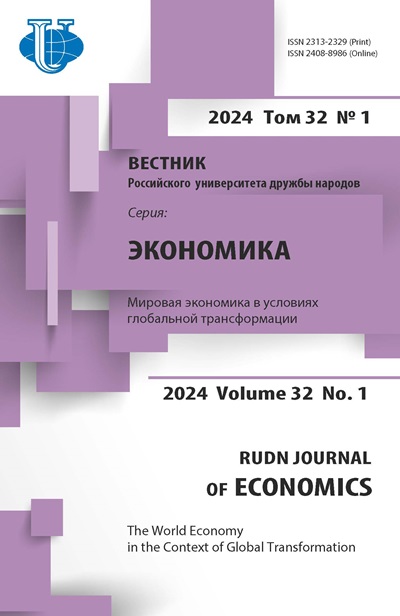“RUSSIAN-RUSSIAN” ECONOMY AS THE MECHANISM OF THE INTEGRATION OF RUSSIAN-SPEAKING MIGRANTS IN THE RECEIVING COUNTRIES
- Authors: Ryazantsev SV1,2
-
Affiliations:
- Institute for Socio-Political Studies of the Russian Academy of Sciences
- Peoples’ Friendship University of Russia
- Issue: Vol 25, No 1 (2017)
- Pages: 122-136
- Section: Articles
- URL: https://journals.rudn.ru/economics/article/view/17178
- DOI: https://doi.org/10.22363/2313-2329-2017-25-1-122-136
Cite item
Full Text
Abstract
Emigration from Russia led to the forcing and expansion of Russian-speaking communities in various countries of the world. The Russian-speaking audience is very large and represents a large segment of some national economies. The example of some countries of the world (the USA, Thailand, Australia, and European countries) explores a new social phenomenon - the “Russian-speaking” economy, which occupies an important place in the life of Russian-speaking communities and includes a system of institutions, infrastructure and economic relations between their representatives, based on the use and dominance of the Russian language. Newly arrived immigrants from Russia and the countries of the former USSR are integrated into host societies, acquiring first experience of work and living in new conditions more often in the “Russian-speaking” economy. Russian-speaking communities are expanding due to a constant supply of immigration from Russia - it is not just new workers, but also buyers of goods and consumers of services. In some cases, the development of a “Russian-speaking” (ethnic) economy combined with other factors is a stimulus for migration from Russia to host countries.
About the authors
S V Ryazantsev
Institute for Socio-Political Studies of the Russian Academy of Sciences; Peoples’ Friendship University of Russia
Author for correspondence.
Email: riazan@mail.ru
Corresponding Member of the Russian Academy of Sciences, Doctor of Economics, Professor, Head of the Center for Social Demography of the Institute for Socio- Political Research of the Russian Academy of Sciences, Professor of the Department of the Foreign Economic Activity of the PFUR
ul. Fotievoy, 6, building 1, Moscow, Russia, 119333; Miklukho-Maklaya str., 6, Moscow, Russia, 117198References
- Vse bol’she rossiyan zadumyvayutsya ob ehmigracii. Issledovanie ROMIR [Elektronnyj resurs]. Rezhim dostupa: http://romir.ru/studies/390_1348084800/ (data obrashcheniya 11.02.2017) (In Russ.)
- Informaciya Konsul’skogo departamenta MID Rossii [Elektronnyj resurs]. Rezhim dostupa: http://www.kdmid.ru/opendata/default1.aspx (Data obrashcheniya 13.03.2017) (In Russ.)
- Ryazancev S.V. Emigranty iz Rossii: russkaya diaspora ili russkogovoryashchie soobshchestva? // Sociologicheskie issledovaniya. 2016. № 12. S. 84—94. (In Russ.)
- Ryazancev S.V., Kuznecov N.G., Hramova M.N., Luk’yanec A.S. Faktory, formy i tendencii ehmigracii rossijskih grazhdan v strany Yugo-Vostochnoj Azii // Segodnya i zavtra rossijskoj ehkonomiki. 2016. № 79—80. S. 3—8. (In Russ.)
- Ryazancev S.V., Pis’mennaya E.E. Emigraciya uchenyh iz Rossii: «cirkulyaciya» ili «utechka» umov // Sociologicheskie issledovaniya. 2013. № 4. S. 24—35. (In Russ.)
- Ryazancev S.V., Pis’mennaya E.E., Kuznecov N.G. Vliyanie vizovogo rezhima na turizm rossiyan v strany Yugo-Vostochnoj Azii // Turizm: pravo i ehkonomika. 2014. № 3 (50). S. 2—7. (In Russ.)
- Vystupleniya protiv russkogo biznesa na Phukete // Novosti Tailanda. URL: http://thailand-news.ru/news/turizm/vystupleniya-protiv-russkogo-biznesa-na-phukete (data obrashcheniya: 15.02.2016) (In Russ.)
- Russkij poselok v Tailande // Komsomol’skaya pravda v Tailande. Maj 2013 (In Russ.)
- Iontsev V.A., Ryazantsev S.V., Iontseva S.V. Emigration from Russia: New trends and forms Economy of Region Issue 2. 2016. Pages 499—509. doi: 10.17059/2016-2-15
- Ryazantsev S.V. The Modern Russian-Speaking Communities in the World: Formation, Assimilation and Adaptation in Host Societies // Mediterranean Journal of Social Sciences. 2015. Vol. 6. № 3. May. P. 155—164. doi: 10.5901/mjss.2015.v6n3s4p155
- Ryazantsev S., Pismennaya E. Demographic Development of Vietnam in the Context of the “Asian Vector” of Russia’s Foreign Policy // The Social Sciences. 2016. № 11. P. 5638—5642. doi: 10.3923/sscience.2016.5638.5642















